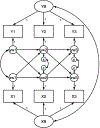Using Time-Lagged Panel Data Analysis to Study Mechanisms of Change in Psychotherapy Research: Methodological Recommendations
- PMID: 34093088
- PMCID: PMC8171261
- DOI: 10.1002/capr.12293
Using Time-Lagged Panel Data Analysis to Study Mechanisms of Change in Psychotherapy Research: Methodological Recommendations
Abstract
The introduction of novel methodologies in the past decade has advanced research on mechanisms of change in observational studies. Time-lagged panel models allow to track session-by-session changes and focus on within-patient associations between predictors and outcomes. This shift is crucial, as change in mechanisms inherently takes place at a within-patient level. These models also enable preliminary casual inferences, which can guide the development of effective personalized interventions that target mechanisms of change, used at specific treatment phases for optimal effect. Given their complexity, panel models need to be implemented with caution, as different modeling choices can significantly affect results and reduce replicability. We outline three central methodological recommendations for use of time-lagged panel analysis to study mechanisms of change: a) Taking patient-specific effects into account, separating out stable between-person differences from within-person fluctuations over time; b) properly controlling for autoregressive effects; c) considering long-term time-trends. We demonstrate these recommendations in an applied example examining the session-by-session alliance-outcome association in a naturalistic psychotherapy study. We present limitations of time-lagged panel analysis and future directions.
Keywords: Cross-Lagged Panel Model; Mechanisms of change; Process-Outcome Research; Psychotherapy Research.
Figures





Similar articles
-
Time-lagged panel models in psychotherapy process and mechanisms of change research: Methodological challenges and advances.Clin Psychol Rev. 2024 Jun;110:102435. doi: 10.1016/j.cpr.2024.102435. Epub 2024 Apr 27. Clin Psychol Rev. 2024. PMID: 38703437 Review.
-
Working alliance predicts symptomatic improvement in public hospital-delivered psychotherapy in Nairobi, Kenya.J Consult Clin Psychol. 2019 Jan;87(1):46-55. doi: 10.1037/ccp0000363. Epub 2018 Nov 15. J Consult Clin Psychol. 2019. PMID: 30431300 Free PMC article.
-
How to model and interpret cross-lagged effects in psychotherapy mechanisms of change research: A comparison of multilevel and structural equation models.J Consult Clin Psychol. 2022 May;90(5):446-458. doi: 10.1037/ccp0000727. J Consult Clin Psychol. 2022. PMID: 35604748 Free PMC article.
-
Dynamic models of individual change in psychotherapy process research.J Consult Clin Psychol. 2017 Jun;85(6):537-549. doi: 10.1037/ccp0000203. Epub 2017 Apr 10. J Consult Clin Psychol. 2017. PMID: 28394170
-
Mapping patterns of change in emotion-focused psychotherapy: Implications for theory, research, practice, and training.Psychother Res. 2018 May;28(3):389-405. doi: 10.1080/10503307.2018.1435920. Epub 2018 Feb 21. Psychother Res. 2018. PMID: 29466928 Review.
Cited by
-
Do therapist effects really impact estimates of within-patient mechanisms of change? A Monte Carlo simulation study.Psychother Res. 2020 Sep;30(7):885-899. doi: 10.1080/10503307.2020.1769875. Epub 2020 Jun 2. Psychother Res. 2020. PMID: 32482144 Free PMC article.
-
What Research Evidence Is Valid for Psychotherapy Research?Front Psychiatry. 2021 Jan 11;11:625380. doi: 10.3389/fpsyt.2020.625380. eCollection 2020. Front Psychiatry. 2021. PMID: 33505325 Free PMC article.
-
Psychedelic-assisted psychotherapy: where is the psychotherapy research?Psychopharmacology (Berl). 2024 Aug;241(8):1517-1526. doi: 10.1007/s00213-024-06620-x. Epub 2024 May 24. Psychopharmacology (Berl). 2024. PMID: 38782821 Review.
-
Potential causal and temporal relationship between plasma triglyceride levels and circulating leukocyte.J Lipid Res. 2024 Nov;65(11):100662. doi: 10.1016/j.jlr.2024.100662. Epub 2024 Oct 5. J Lipid Res. 2024. PMID: 39369792 Free PMC article.
-
The bi-directional influence of social functioning and mental health symptoms during psychological treatment: A cross-lagged analysis in young adults.Int J Clin Health Psychol. 2025 Jul-Sep;25(3):100608. doi: 10.1016/j.ijchp.2025.100608. Epub 2025 Jul 5. Int J Clin Health Psychol. 2025. PMID: 40688558 Free PMC article.
References
-
- Allison PD (2009). Fixed effects regression models. CA: Sage Publications.
-
- Allison PD, Williams R, & Moral-Benito E (2017). Maximum Likelihood for Cross-lagged Panel Models with Fixed Effects. Socius, 3, 2378023117710578. doi:10.1177/2378023117710578 - DOI
-
- Antonakis J, Bendahan S, Jacquart P, & Lalive R (2010). On making causal claims: A review and recommendations. The Leadership Quarterly, 21, 1086–1120. doi:10.1016/j.leaqua.2010.10.010 - DOI
-
- Arellano M, & Bond S (1991). Some tests of specification for panel data: Monte Carlo evidence and an application to employment equations. Review of Economic Studies, 58, 277. doi:10.2307/2297968 - DOI
-
- Bollen K. a., & Curran PJ (2004). Autoregressive Latent Trajectory (ALT) Models: A Synthesis of Two Traditions. Sociological Methods & Research, 32, 336–383. doi:10.1177/0049124103260222 - DOI
Grants and funding
LinkOut - more resources
Full Text Sources
Miscellaneous
